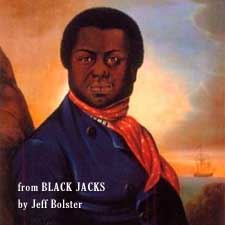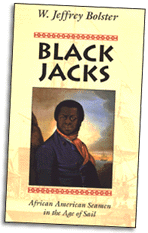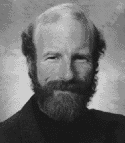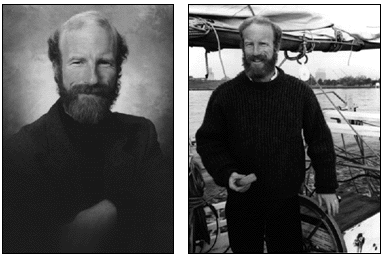|
FRESH STUFF DAILY |
|
|
||
|
|
||
|
|
||
|
SEE ALL SIGNED BOOKS by J. Dennis Robinson click here |
||
Ten years in preparation, Prof. Jeffrey Bolster's detailed book on black mariners is a landmark publication. This interview was recorded at SeacoastNH.com offices by J. Dennis Robinson, two months prior to the book's release.
An Interview With author W. Jeffrey Bolster BLACK JACKS SeacoastNH.com: During the age of sail what was the role of black mariners. It's a role we've never even heard of before. SeacoastNH.com: You tell us in your book that as many as twenty-five percent of mariners on these ships were black. How did they disappear from history if they were so important? Another reason is that in the early 20th century a lot of the maritime history museums that were created were children really of the colonial revival. They were created by well-to-do, white easterners, wishing to capture a certain vision of their past and there was an airbrushing out of black people in a variety of roles, specifically in the maritime roles. In the kind of iconography -- the placemats, the posters, the film casting, the statuary that was meant to evoke the maritime past became transformed. No longer did you see, like in the federal crew list, 20 or 25 percent black men in a given ship. You didn't see any. So for various reasons within the white communities, within the black communities in seaports up and down the east coast, the memory of what was once a very important part of African American, what was once a very important part of maritime America, was lost. SeacoastNH.com: If you had to do a case history or try to come up with a portrait of the black mariner at this time -- what was he like? Bolster: In the late 1700s, in the age of the American Revolution, the black mariner would be a man, probably in his 20s or early 30s. much more likely than his white shipmates to have a family because white sailors were notoriously single, footloose and fancy free in some ways. Black men found so few opportunities to make a living that they were more likely to stick with this very difficult employment -- seafaring -- while still trying to raise a family. Sort of a catch-22 situation. The man in the late 1700s was very likely to have been born a slave. It was almost certain that his parents had been slaves because there were so few free black people in these colonies before the revolution. That man, however, might have come from the Chesapeake Bay region -- Virginia, Maryland -- he might well have come from the Carolinas. He might well have come from the Caribbean Islands or from a north seaport like Boston or Providence, R.I. In other words, in almost every colony of the British empire, all of which were maritime colonies, men of color sailed aboard these ships and as they shifted from being slaves to free men they continued to work at sea. QUICK CLICK to Questions What happened when free mariners encountered a world of slavery? How did these sailors disseminate black culture? What about black mariners in Seacoast NH? Tell us about the 10 years you spent as a mariner and the 10 years you spent writing this book. What do you hope the impact of this book will be? About the Author SeacoastNH.com: So these people were predominantly free men in an era of slavery? What happens when a person who has some freedom arrives in a world full of slavery? How does he fit into this world? Bolster: That question speaks to the raising of political consciousness, to the raising the political sensibilities among free men of color who worked aboard ships in a world that was still defined by slavery. We have numerous instances of free black men from the north or England sailing into a southern harbor or southern river and being captured, being kidnapped, being stolen back into slavery. This happened thousands and thousands of times. It's clearly documented. We have instances in which one of the most famous black men of his generation, Captain Paul Couffe, a free black man from Massachusetts, who was a ship builder and a ship owner, who sailed primarily with crews composed of African American and Indian men. (He) found his crew detained. Traveled overland to speak personally with the president of the United States demanding that he have a clearance for his ship. We have many other instances in which after 1822 southern states following the lead of South Carolina, began to jail black men simply by being free and arriving in a southern state where slavery still existed. Free men were taken off their ships and put in jail until their ships sailed. My calculations show that there were over 10,000 free black northern men who spent time in southern prisons simply for arriving as free sailors on ships and being detained in New Orleans or Charleston or Savannah or elsewhere. So the implications of seafaring for free men was that it heightened their political consciousness, frequently made them quite afraid. It also led to a certain bravado. I found instances of men who individually had been jailed seven or eight times in southern ports. In other words, they kept returning they kept working aboard ship knowing full well that upon arrival in Charleston or Louisiana they would be put into jail and they were, seven, eight, nine times. I found ships articles being signed "Liverpool, England" where the black men consented ahead of time knowing that they were going to New Orleans that of course they would be put into jail. So there was a certain degree of bravado, of standing up to "The Man" that comes through in those records. Clearly however, these were northern men, English men who became the eyes and ears of their communities by sailing into the heartland of slavery, spending time in jail, rubbing elbows with slaves in those jails and then sailing back out again in many instances to disseminate what they had learned. CONTINUE to Next Question SeacoastNH.com: So these men end up being the disseminators of culture in a world in which the culture that we know has been pretty much wiped out. Bolster: I think we actually know a lot about slavery. I mean, I might challenge you a little bit about the assumptions of that question. I think that historians increasingly know more and more about slavery and that recently there have been marvelous films on public televisions and other forms that have made us learn more about slavery. I will say, in terms of disseminating culture, that my vision of these black mariners are men who cross-pollinated a variety of communities around the rim of the Atlantic in an age when most black people were illiterate, in an age when most black communities were not linked together by either newspapers or record albums or cassette tapes. In which communication between widely dispersed people of color was by oral communication, by people who physically went from one place to another. One of the largest groups of people who moved repeatedly during the age of slavery between these widely dispersed slave communities were mariners. Of course there were valets who accompanied their masters on trips. There were slaves who were sold from place to place. But in terms of regular and repeated sorts of contacts, moving between the West Indian Islands, the Carolina low country, urban seaports like New York and Philadelphia, metropolitan capitals like London, the group that consistently emerges doing this are black sailors. So it's no surprise to me that the first six autobiographies published in English language by black men were written by mariners. It's no surprise to me that it was mariners who were disseminating particular forms of African inspired martial arts like stick fighting and head butting which we have ample evidence of from around the Atlantic. So I see men of color on these ships, whether sailing as cooks or cabin boys, whether as stewards or able-bodied seamen, whether as harpooners or petty officers aboard whale ships, I see these men as having a particular niche in the formation of African America. CONTINUE to Next Question SeacoastNH.com: So what about Seacoast, New Hampshire? what can you tell us about our own region? Bolster: New Hampshire is clearly to this day a very white state and always has been. In fact, in 1776 as these colonies embarked on revolution, of all of the British colonies -- 22 colonies in the new world and of which 13 became the United States -- slavery was receding in only two of those colonies. One was Nova Scotia, the other was New Hampshire. By that I mean slavery was very vital in all the rest of these somewhat sanctimonious northern states. In New Hampshire, the bulk of slaves that did exist were in the mansions of the seacoast elite. They were the domestic servants, the gardeners, the valets, the nurses, the seamen and stevedore of a mercantile class. What we have in the Piscataqua region, this river that divides New Hampshire from Maine, are a number of marvelous, stately homes, revealing the profits of that era. We also have clear evidence of lots of black men working on board ship here. If you look in the New Hampshire newspaper, in Dover, In Durham where the University now is, from the 1770s you'll see advertisements for "Negro" man slaves to be sold who had seafaring experience." If you probe a little deeper, into the account of privateers sailing from here around 1805, you find that a well-known character on the Portsmouth docks, a man named Moses, was a black seaman from Portsmouth, NH who became a hero when his vessel was captured at sea by French privateers, and he was later able to reseize his ship and sail her back to home. There are instances like Jude Hall from Exeter, New Hampshire, a black Revolutionary War hero who had three sons, all three of whom went to sea, two of whom were kidnapped in the fashion I mentioned before into slavery in the South, one of whom left the United States, the country his father had fought for, and moved to England where he became captain of a collier, a coal-carrying vessel. So there certainly are examples of black seamen from New Hampshire in the late 18th, early 19th century -- slaves and freemen, cooks and captains, but again just in sheer numbers the history of men of color in New Hampshire is smaller than the history of men of color elsewhere. CONTINUE to Next Question SeacoastNH.com You took 10 years to research and write this book. You also spent 10 years as a mariner yourself. Were these overlapping time periods or two completely separate time periods? Bolster: Little bit overlapping, mostly separate. I spent ten years as a mariner. I am a licensed merchant marine officer and I have a considerable amount of sea time. I sailed as a captain on a number of American ships including several of the research vessels and a lot of sailing school ships -- the kind of vessels that are [known] as "tall ships," so I have some "square rig" experience, I have a lot of experience commanding big schooners and I have a lot of sea time. I keep my license up but in the last ten or eleven years I haven't sailed much on it. A few trips in the Caribbean, Scandinavia and this and that, but for the most part I've been shifting careers, moving from being a mariner to being a historian. When I began that shift, I went ashore and began a master's degree in history back in 1983 at Brown University. Looking around for a topic, I started going though Customs House records looking for something entirely different and I came across this shipping list for the port of Providence, Rhode Island from 1803 to 1804 and I began to go through it. I was amazed at the number of Black men and Native American men on those lists. So I did some counting, some tallying from 1803 to 1810, 1830 to 1840, and I began to realize exactly how many of the sailors on these American ships from Rhode Island were men of color. Now earlier I'd been back in the West Indies myself sailing these different vessels. I'd been talking to these old black West Indian guys about sailing schooners [down there] and getting a sense of what they were about. I read some of these memoirs. The most famous memoir by a black seaman from late 1700s: Olaudah Equiano. I had read his account years before. A shipmate loaned it to me one night when I on the schooner Harvey that was rolling on to Cape Haitian and I read this account. What we had here was an African man, an Ebo man, who had been a slave -- was then a freeman who had sailed the same waters I was two hundred years before. So what happened when I was in Rhode Island, looking at those federal shipping lists is that all this began to come together for me. I talked with these old West Indian schooner sailors, owner-operators who had considerable experience sailing around the West Indies. I read an account of a slave sailor 200 years before who I had then thought was sort of an anomaly. I'd been to all the maritime museums on the East Coast, some on the West Coast. I'd read a lot about seafaring labor and maritime history. I'd always been interested in it. And I had never really seen much about black men. And yet here I was in the federal shipping records from 1803 to 1810, the federal shipping records from 1830 to 1840 for a major American port -- and there were lots of black men. So, in the words of a fledgling historian, this is a story that I felt was worth pursuing and I did. While I went back to sea for a couple of years as a professional mariner, I finished a master's degree. Kept sailing, but I decided I wanted to pursue this Ph.D. so I left the sea again for a second time and went to Baltimore to Johns Hopkins University to start a Ph.D. and picked up my research sort of on the trail of black mariners from there. Here we are. CONTINUE to Next Question SeacoastNH.com: Here we are with a book about to come out. What do you think the impact will be of this book arriving, which you say is academic, [published by Harvard Press] but readable? What do you hope the impact will be of the book? Bolster: My challenge was to write a book that would conform to the professional standards of historians -- I am a card-carrying historian and work in a university -- but a book that would be accessible to a wider public. I may have succeeded. I was told today by the publisher that my book has been selected for the History Book Club. That's good. There's a review that's just come out for "The Library Journal" that encourages public and academic libraries across the country to buy the book. That's good. And I've already been contracted to do a number of book signings at Barnes & Noble Bookstores, museums, and other places just in the next few months because of this book. So my sense is that there are a lot of people who are hungry for this story. My sense is there are a lot of people -- black and white -- who haven't really thought about the term "black sailor" Just the linkage of those two terms has been strange for some people -- black people because those memories have been erased, white people because [they] haven't chosen to look at it that way. So the topic, I think, has grabbed a lot of people as being fresh. It's a way to look at African American history from a new perspective. It's a way to think about the formation of Black America. It's a way to bring a fuller and more honest treatment to maritime history because, in the past, museum exhibits or placemats or statues might have lied about the racial composition of America's maritime workforce in the Age of Sail. [Now we see] men who manned those clipper ships and whaling ships, and men who manned naval vessels, crew lists and the memoirs and legal papers. They don't lie. I've found an avalanche of material for a topic which, when I began, I was [told] "Don't try to write a book about black sailors. You won't find much material." Actually I found a cascade of material. So I think it's a story people are ready to hear all across the country --different age groups. different races -- people who are interested in the sea, people who are really just interested in Afro-America. So I think that my story is one that is able to transcend a particular or particularistic interest in things maritime or things seafaring -- and really speak to the formation of Black America. SeacoastNH.com: Many thanks Jeff Bolster, for this interview and good luck with your new book. OURSIDE LINK: Reviews in info about Black Jacks © 1997 SeacoastNH.com. All rights reserved CONTINUE to info on author Jeff Bolster
Jeff Bolster lives in Portsmouth, NH and is Associate Professor of History at the University of New Hampshire, He is editor of Cross-Grained and Wily Waters Please visit these SeacoastNH.com ad partners.
News about Portsmouth from Fosters.com |
| Friday, April 26, 2024 |


|
Copyright ® 1996-2020 SeacoastNH.com. All rights reserved. Privacy Statement
Site maintained by ad-cetera graphics

 Stories
Stories






















